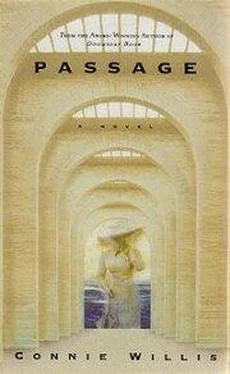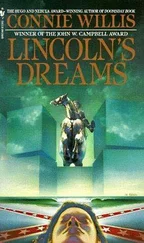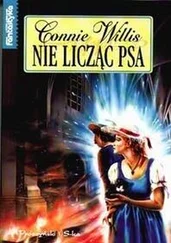“Dr. Murrow was so happy with her progress on the inderone, he told us she could go home a day earlier,” she told Joanna brightly. She opened the closet door and picked up Maisie’s Barbie duffel bag.
Joanna glanced at Maisie, but she seemed unconcerned. “Dr. Murrow also said Maisie could start thinking about going back to school,” Mrs. Nellis said. She laid the duffel bag on the chair. “I’ll give you two a chance to chat. I need to talk to Dr. Murrow about getting Maisie on an experimental ACE-blocker before we leave.”
As soon as she went out, Maisie said, “I was afraid I was going to already be gone,” and pulled a folded piece of paper out of a patch pocket and handed it to Joanna. Joanna unfolded it. It said, “Joseph Leibrecht. 1968.”
Maisie said, “Ms. Sutterly said the guy who wrote the book went to Germany and interviewed this Leibrecht guy when he was writing the book. In 1968. Can you use it? His NDE?”
She couldn’t possibly. The Hindenburg had crashed in 1937, over thirty years before. Events remembered from that long ago would inevitably be distorted, details forgotten and added, blanks filled in with confabulations. It was virtually useless, but she hated to disappoint Maisie. “You bet,” she started to say, and realized Maisie was waiting, breath held, for her answer, as if it were some sort of test.
“I’m afraid I can’t,” Joanna said. “NDE interviews need to be done right after the experience, or people forget things.”
“Or make up things,” Maisie said.
“That’s right,” Joanna said. “I’m sorry.”
“That’s okay,” Maisie said, not upset at all. In fact, she was grinning.
Joanna grinned back. “So you’re going home? Are you happy about that?”
She nodded. “Ms. Sutterly took my books for me,” she said, with a significant look at the duffel bag.
“Good. So how’s the Lusitania?”
“I’m not interested in it anymore,” she said. “It didn’t take very long to sink. Have you ever been to a circus?”
She would never get used to Maisie’s sudden conversational shifts. “Yes,” she said, “when I was a little girl.”
“Was it fun? Were there clowns?”
“Yes and yes,” Joanna said, thinking, even Mrs. Nellis would approve of this conversation. “I remember one clown who had a red nose and baggy pants, and he pulled a big polka-dot handkerchief out of his pocket to blow his nose with, but it was tied to a big red handkerchief, and that was tied to a blue one and a green one and a yellow one, and he just kept pulling and pulling and pulling handkerchiefs out of his pocket, looking for the end.”
“I bet that was funny,” Maisie said. “Do you know what a Victory garden is?”
“A Victory garden?” Joanna asked, lost again. “I’m not sure. I know what one kind is. During World War II, people planted gardens to grow food for the army. And the navy,” she added, thinking of Mr. Wojakowski, “to help win the war, and they were called Victory gardens. Is that the kind you mean?”
“I think so,” she said. “There was this circus in Hartford, that’s in Connecticut, and the tent caught fire and they all burned to death.”
I might have known, Joanna thought.
“One hundred and sixty-eight people died,” Maisie said. “I’d show you the picture except I don’t have my books. I’ll bring them next time I come to the hospital.”
“How do you know there’ll be a next time? Your mother says you’re really doing well,” Joanna nearly said, and then bit it back. “How did the fire start?” she asked instead.
Maisie shrugged her thin shoulders. “Nobody knows. It just happened.”
It just happened, Joanna thought. A cigarette, a spark, in sawdust or canvas and, just like that, one hundred and sixty-eight people dead. And probably most of them children, Joanna thought, knowing circuses. And Maisie.
“Lots of kids died,” Maisie said, as if reading her mind. “Do you think it hurts to die? In a fire, I mean.”
“I don’t know,” Joanna said, well aware of what she was really answering. “Probably only for a little while. Most of them probably died of smoke inhalation. I think the worst part would be the being afraid.”
“Me, too,” Maisie said. “When I coded, it only hurt for a minute. I wasn’t afraid either.” She looked at Joanna seriously. “Do you think that’s what NDEs are for, to keep you from being afraid?”
“That’s what Dr. Wright and I are trying to find out.”
“What do you think happens after that, after the NDE?” Joanna had known this was coming, ever since their conversation about Ulla. She glanced at the door, wishing Maisie’s mother would magically appear with a wheelchair and happy thoughts.
“I want to know,” Maisie said. “The truth.”
“The truth is, I don’t know,” Joanna said. “I think probably nothing. When the heart stops beating, the body quits sending oxygen to the brain, and the brain cells start to die, and when they die, you can’t think anymore, and it’s like going to sleep or switching a light off.”
“Like shutting down C-3PO,” Maisie said eagerly.
“Yes, just like that,” Joanna said, thinking that if this conversation was upsetting or frightening Maisie she certainly wasn’t showing it.
“Would it be dark?” Maisie asked.
“No. It wouldn’t be anything.”
“And you don’t even know you’re dead,” Maisie said.
“No,” Joanna said, “you don’t even know you’re dead,” and for some reason thought of Lavoisier.
“How come you said probably?” Maisie asked. “You said probably nothing happens.”
“Because nobody knows for sure,” she said. “No dead person’s ever come back to tell us what death is like.”
“Mr. Mandrake says he knows,” Maisie said, making a face. “When he came to see me that time I coded, he said he knows exactly what happens after you die.”
“Well, he doesn’t.”
Maisie nodded sagely. “He says all the people you know who’ve died are there waiting for you, and then you all go to heaven. I think that’s what he wants to be true. Just because you want something to be true doesn’t make it true. Like with Tinkerbell.”
“No, it doesn’t,” Joanna said. “But just because you want something to be true doesn’t make it not true either.”
“So there might be a heaven,” Maisie said.
“There might,” Joanna said. “Nobody knows.”
“Except people who’ve died,” Maisie said. “And they can’t tell us.” No, Joanna thought, they can’t tell us. In spite of Richard’s and my best efforts.
“So everybody has to find out for themself,” Maisie said, “and nobody gets to go with you. Do they?”
No, Joanna thought. I wish I could, kiddo. I hate to think of you having to go through it by yourself. But everybody has to die alone, no matter what Mr. Mandrake says. “No,” she said.
“Unless it’s a disaster,” Maisie said. “Then a whole bunch of people die all together. Like the Hartford circus fire. They couldn’t get out because the animal cages, you know, for the lions and tigers, were in the way, and everybody kept pushing and they all got smushed to death except for the ones who had smoke…” She frowned, groping for the word.
“Inhalation,” Joanna said.
“All set,” Maisie’s mother said gaily, coming in with a wheelchair. “As soon as the nurse brings in your release form, we can go.” She began helping Maisie into the wheelchair.
“I’ve got to go, too,” Joanna said. “Good-bye, kiddo. Be good.” She started back to the lab. Barbara was in the nurses’ station, filling out paperwork. Joanna looked back down the hall to make sure Maisie and her mother were still in Maisie’s room, and then said to Barbara, “Maisie’s mother said she’s doing better. Is she?”
Читать дальше












